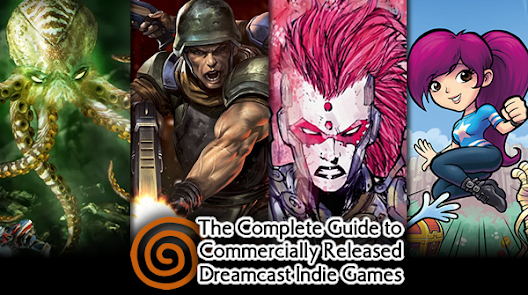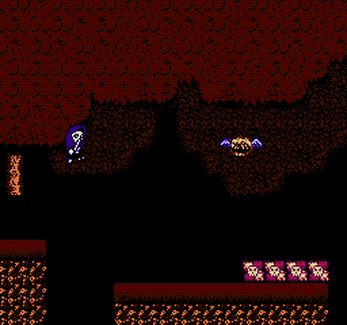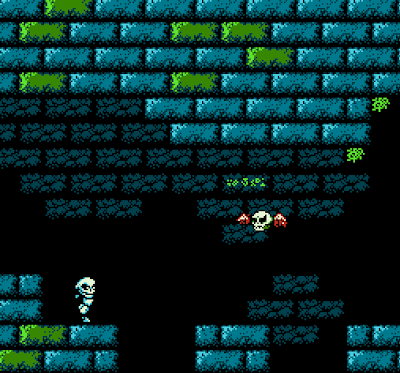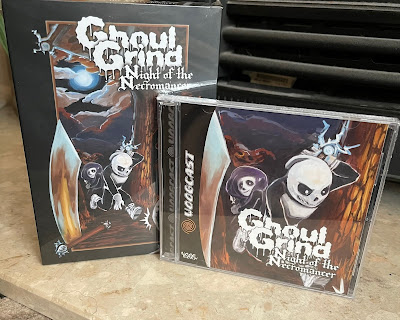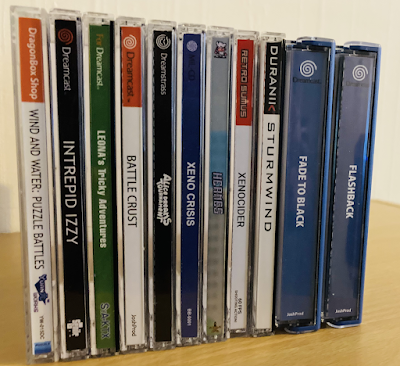Full disclosure: The Dreamcast Junkyard has been reporting on the development of Xenocider pretty much since we learned of its existence, and prior to that we reported on Retro Sumus' previous foray into indie dev, Ameba. Over the years we have built up something of a friendship with Carlos Oliveros and the development team working on Xenocider. However, in the interests of transparency and 'ethics in games journalism,' we will not be giving Xenocider a free pass. This review will be conducted with the same unbiased cantankerousness as you've come to expect here at the Junkyard. With that out of the way, on with the review!
Retro Sumus first appeared on our collective radar way back in November 2014, when the Spain-based indie developer announced a visual novel starring a down at heel detective trying to solve a mysterious, supernatural murder. That game was Ameba, and since it was first introduced to the community it has been put on the back burner. Not because of any kind of internal turmoil, development hell or the game quietly becoming vapourware; but because Retro Sumus turned their attention to another project that was initially going to play second fiddle to Ameba. That side project appeared to hold more appeal to the development team and as they pivoted away from Ameba, the projects switched places with the former going into hibernation and Xenocider - the other game - stepping into the limelight.
Now, almost 7 years later, and after a number of huge revisions and an entire lore being created, Xenocider has finally landed on the Dreamcast. A bespoke, independently developed title, created and sculpted for the best part of a decade to run exclusively on Dreamcast hardware and utilising a game engine built from the ground up. You really couldn't make this up. And now, at long last - and much to the relief of the long-suffering dev team, no doubt - Xenocider is finished. It's real, it exists, it is playable on an actual Dreamcast...and by jove it's glorious.
As my learned colleague Mike Phelan alluded to in his comprehensive Arcade Racing Legends review, it would be quite easy for us Dreamcast fanatics to frothingly praise any and every new game to hit the console as a marvel, a wondrous and near perfect experience, simply by virtue of it being a game released for the Dreamcast. To proclaim everything as amazing, awesome, fantastic (or to use any number of other equally meaningless superlative descriptions) is far too easy these days; to turn a blind eye to a game's shortcoming and to give it a free pass simply 'because it's on Dreamcast.' I am all too aware of this trap, and I refuse to fall down into it. I am a hard man to please and I don't believe in sycophantically announcing every new Dreamcast game as the greatest thing since sliced bread.
With this in mind however, I'm quite confident in saying that Xenocider, for all its faults - which we'll cover later - still manages to elevate itself to the upper echelons of the Dreamcast indie library and sit proudly up there alongside stuff like Xeno Crisis, Alice Dreams Tournament, Leona's Tricky Adventures, Wind & Water Puzzle Battles and Sturmwind. That's because this is a game crafted with obvious love and devotion not only to the Dreamcast, but also with a devilish wink and a nod to other games it clearly takes inspiration from; simultaneously offering a refreshingly original take on the sci-fi shooter genre while presenting the discerning Dreamcast gamer with a hoard of gameplay modes, and as many extra bells and whistles as you'd normally expect to find in a current gen title.
Before we get to the game itself, it's worth mentioning the love and care that has clearly gone into creating the whole Xenocider package. From the excellent bespoke cover art drawn by DC Comics' Agustin Padilla, to the quality of the printed booklet and covers, to the artwork on the game disc itself (and on the bonus music CD if you have the two-disc special edition), everything about Xenocider's physical appearance exudes an air of professional attention to detail that is fantastic to see in an independently developed Dreamcast game; and like the JoshProd, Bitmap Bureau, Yuan Works and Duranik titles which came before it, the faux NTSC or PAL styling of the boxes means Xenocider will slot nicely in alongside its contemporaries on any discerning Dreamcast owner's shelf of indies.
So what of the actual game then? Well Xenocider is essentially an 'into the screen' run and gun shooter much in the style of retro favourites such as Space Harrier and Sin & Punishment. I'm not remiss to use those two titles as comparisons as Retro Sumus themselves have often cited those games as inspirations for Xenocider. Here though, you take on the role of Xara, a cybernetic Oppenheimer - quite literally a destroyer of worlds - who must planet hop through the star system, wiping out all lifeforms in her wake before eliminating an end of level boss...and ultimately the very planet itself. Pretty hairy stuff, we're sure you'll agree, and it's upon learning the main objective of the game that the title starts to make more sense. Furthermore, to reveal quite why all this death-bringing is going on would be to reveal spoilers...so we'll say no more.








